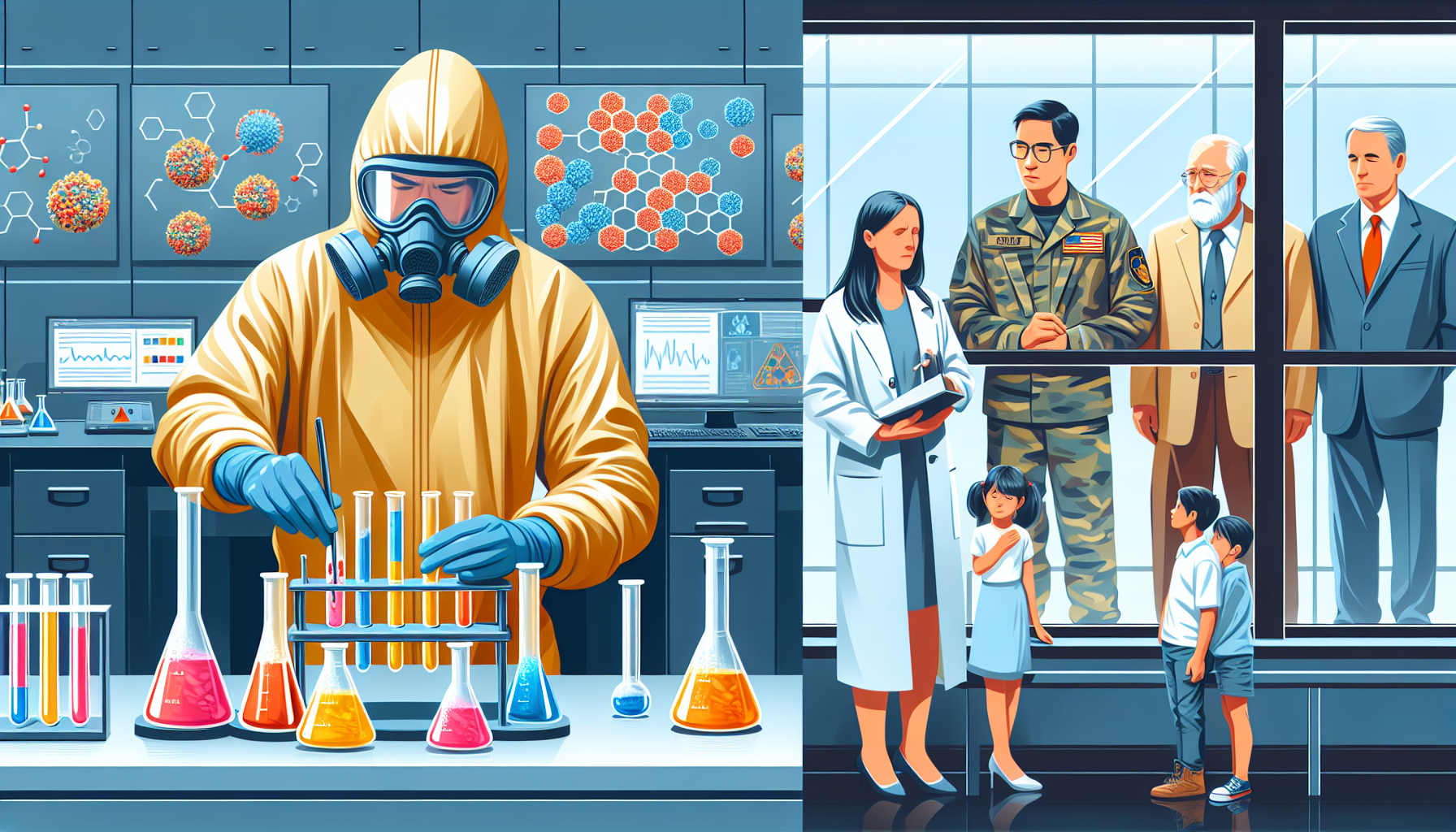Definition
Chemical warfare (CW) refers to the use of toxic chemical substances as weapons during military operations. These substances are intentionally deployed to harm, incapacitate, or kill adversaries and can be delivered using various means, such as missiles, bombs, or artillery shells. CW is highly controversial due to its potential for causing widespread devastation, long-term environmental damage, and severe harm to civilians.
Key Takeaways
- Chemical warfare (CW) refers to the use of toxic chemical substances, such as gases, liquids, or solids, as weapons to harm or kill opposing forces in a military conflict. These chemicals can also be weaponized for the purpose of threatening or forcibly suppressing populations.
- Chemical weapons have been internationally condemned due to their ability to cause widespread and indiscriminate suffering, as well as long-term damage to human health and the environment. The Chemical Weapons Convention (CWC), signed in 1993, aims to prevent the production, stockpiling, and use of chemical weapons by its signatories through international cooperation and oversight.
- Examples of well-known chemical warfare agents include mustard gas, sarin, and VX nerve agents. These toxic compounds can produce various effects, such as incapacitation, respiratory distress, nerve damage, and even death. Protection against chemical warfare agents requires specialized equipment, such as gas masks and chemical-resistant clothing, as well as preemptive measures and decontamination procedures.
Importance
Chemical warfare (CW) is an important term in military operations as it refers to the strategic and tactical use of toxic chemical substances, such as blister agents, nerve agents, choking agents, or blood agents, to harm, incapacitate, or kill enemy forces.
CW poses a significant threat in modern warfare due to its potential to cause mass casualties, long-term health effects, and environmental contamination, along with psychological impacts on the affected population.
Understanding and preventing the use of CW has become a critical aspect of military strategy and international security, as evidenced by global efforts to establish and enforce agreements like the Chemical Weapons Convention.
Consequently, countries invest in research and development of protective gear, medical countermeasures, and detection capabilities to mitigate the impact of potential chemical attacks, ensuring the safety and effectiveness of their personnel against this dangerous form of warfare.
Explanation
Chemical warfare (CW) is a strategic and tactical method of combat that serves the purpose of incapacitating, injuring, or annihilating enemy forces and civilian populations through the use of toxic chemicals and agents. These chemicals are designed to directly affect human physiology and to degrade combat effectiveness, ultimately achieving military and political objectives. The employment of CW goes beyond the battlefield, as it is often utilized to demoralize and instill fear in an adversary thereby depleting their capacity to fight and resist.
Such chemicals have a significant psychological impact, as well as the potential to inflict considerable damage to an enemy’s infrastructure. Chemical warfare plays a pivotal role in shaping the outcome of conflicts by impacting various aspects, such as movement, supply lines, and the ability of the enemy to coordinate their forces. The chemicals used in CW can be dispersed through various means including artillery shells, landmines, air-dropped bombs, and aerosol sprays.
Asymptomatic and stealthy in nature, these toxic agents can be difficult to detect and defend against, making them an insidious threat to target populations. The various classes of chemical warfare agents include choking agents, nerve agents, blood agents, and blister agents, each exhibiting unique characteristics and undesired effects. Due to the wide-ranging repercussions and potential for immense human suffering, the use of chemical warfare is considered inhumane, having been banned under the 1925 Geneva Protocol and the Chemical Weapons Convention.
Examples of Chemical warfare (CW)
World War I: One of the earliest examples of large-scale chemical warfare occurred during World War I, particularly in the form of mustard gas, chlorine gas, and phosgene. Both the Allied and Central Powers used these chemical weapons to break the stalemate of trench warfare, causing widespread suffering, injury, and death among soldiers.
Iran-Iraq War (1980-1988): During the conflict between Iran and Iraq, Iraqi forces under the regime of Saddam Hussein used chemical weapons extensively as a part of its warfare strategy. This involved the use of mustard gas, sarin, and tabun against Iranian troops and civilians, as well as against the Kurdish population in the Halabja chemical attack, resulting in thousands of casualties.
Syrian Civil War: In the ongoing Syrian Civil War, which began in 2011, the Assad regime has been accused of using chemical weapons, particularly sarin and chlorine gas, against opposition forces and civilian populations. The most notable incident was the Ghouta chemical attack near Damascus in August 2013, which resulted in hundreds of deaths and led to international condemnation and subsequent efforts to dismantle Syria’s chemical weapons stockpile.
FAQs on Chemical Warfare (CW)
What is chemical warfare?
Chemical warfare (CW) is the use of toxic chemical substances, deployed in various forms such as gas, liquid, or solid, to harm, incapacitate, or kill an enemy. These chemical agents cause severe harm or death through their toxic properties, and their main purpose is to disrupt or hinder an adversary’s military operations.
What are the types of chemical agents used in chemical warfare?
There are four main categories of chemical agents that are used in chemical warfare: nerve agents, blister agents, blood agents, and choking agents. Nerve agents, such as sarin and VX, disrupt the nervous system; blister agents, like mustard gas, cause severe burns and blisters; blood agents, such as hydrogen cyanide, are poisonous and affect the blood’s ability to carry oxygen; and choking agents, like chlorine gas, cause respiratory distress and lung damage.
What is the history of chemical warfare?
Chemical warfare has a long history, with evidence of its use dating back to ancient and medieval times. However, the large-scale use of chemical warfare began during World War I, where poisonous gas was extensively used on the Western Front by both the Allies and Central Powers. Despite attempts to regulate and ban the use of chemical weapons in international conflicts, instances of chemical warfare continued in the 20th century, notably during the Iran-Iraq War in the 1980s and in the Syrian Civil War in the 21st century.
What are the international laws and treaties governing chemical warfare?
The most significant international treaty that addresses chemical warfare is the Chemical Weapons Convention (CWC), which was adopted in 1993 and entered into force in 1997. The CWC prohibits the development, production, stockpiling, and use of chemical weapons and mandates the destruction of existing stockpiles. The Organization for the Prohibition of Chemical Weapons (OPCW) is responsible for monitoring and enforcing the CWC. Other international laws, such as the Geneva Protocol of 1925, also contribute to the regulation of chemical warfare.
What are the long-term effects of chemical warfare on the environment and human health?
The long-term effects of chemical warfare on the environment and human health can be quite severe, depending on the type and scale of chemical agents used. Exposure to some agents may cause chronic health issues or diseases such as cancer, respiratory diseases, and neurological disorders. In addition, chemical warfare can cause environmental degradation and contamination of soil, water, and vegetation, which may harm ecosystems and remain hazardous for extended periods of time.
Related Military Operation Terms
- Agent Orange
- Mustard Gas
- Nerve Agents
- Decontamination Procedures
- Respiratory Protection
Sources for More Information
- CIA (Central Intelligence Agency)
- U.S. Department of Defense
- OPCW (Organisation for the Prohibition of Chemical Weapons)
- FAS (Federation of American Scientists)
 Benefits.com Advisors
Benefits.com Advisors
With expertise spanning local, state, and federal benefit programs, our team is dedicated to guiding individuals towards the perfect program tailored to their unique circumstances.
Rise to the top with Peak Benefits!
Join our Peak Benefits Newsletter for the latest news, resources, and offers on all things government benefits.




















